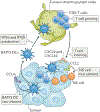Impact of oncogenic pathways on evasion of antitumour immune responses
- PMID: 29326431
- PMCID: PMC6685071
- DOI: 10.1038/nrc.2017.117
Impact of oncogenic pathways on evasion of antitumour immune responses
Abstract
Immunotherapeutic interventions are showing effectiveness across a wide range of cancer types, but only a subset of patients shows clinical response to therapy. Responsiveness to checkpoint blockade immunotherapy is favoured by the presence of a local, CD8+ T cell-based immune response within the tumour microenvironment. As molecular analyses of tumours containing or lacking a productive CD8+ T cell infiltrate are being pursued, increasing evidence is indicating that activation of oncogenic pathways in tumour cells can impair induction or execution of a local antitumour immune response. This Review summarizes our current knowledge of the influence of oncogenic effects on evasion of antitumour immunity.
Conflict of interest statement
Competing interests statement
The authors declare no competing financial interests.
Figures


References
-
-
Tumeh PC et al. PD-1 blockade induces responses by inhibiting adaptive immune resistance. Nature 515 568–571 (2014).
This work provides proof that response to checkpoint blockade therapy (anti-PD1) is associated with the presence of T cells in the tumour microenvironment (TME) (T cell-inflamed phenotype).
-
Publication types
MeSH terms
Substances
Grants and funding
LinkOut - more resources
Full Text Sources
Other Literature Sources
Molecular Biology Databases
Research Materials

